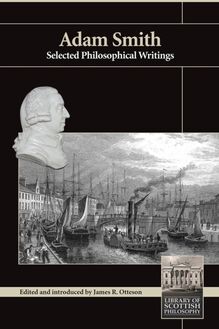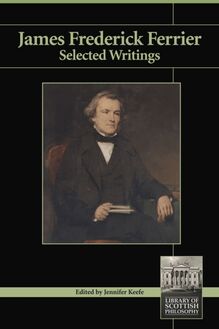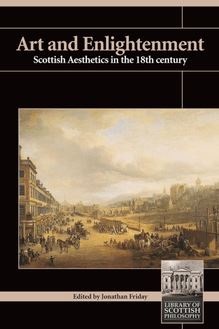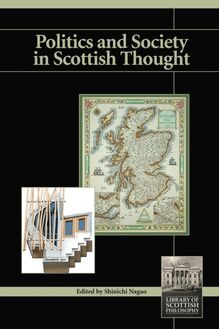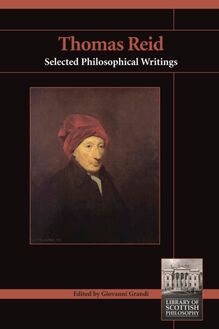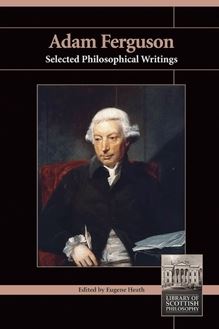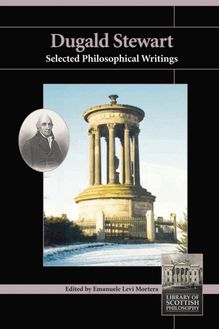Adam Ferguson , livre ebook
108
pages
English
Ebooks
2012
Vous pourrez modifier la taille du texte de cet ouvrage
Obtenez un accès à la bibliothèque pour le consulter en ligne En savoir plus
Découvre YouScribe en t'inscrivant gratuitement
Découvre YouScribe en t'inscrivant gratuitement
108
pages
English
Ebooks
2012
Vous pourrez modifier la taille du texte de cet ouvrage
Obtenez un accès à la bibliothèque pour le consulter en ligne En savoir plus
Publié par
Date de parution
27 septembre 2012
Nombre de lectures
1
EAN13
9781845404420
Langue
English
Publié par
Date de parution
27 septembre 2012
Nombre de lectures
1
EAN13
9781845404420
Langue
English
Title page
Adam Ferguson
Selected Philosophical Writings
Edited and Introduced
by Eugene Heath
Copyright page
Copyright © Eugene Heath, 2007
The moral rights of the author have been asserted.
No part of any contribution may be reproduced in any form without permission, except for the quotation of brief passages in criticism and discussion.
Originally published in the UK by Imprint Academic
PO Box 200, Exeter EX5 5YX, UK
Originally published in the USA by Imprint Academic
Philosophy Documentation Center
PO Box 7147, Charlottesville, VA 22906-7147, USA
2012 digital version by Andrews UK Limited
www.andrewsuk.com
Series Editor’s Note
The principal purpose of volumes in this series is not to provide scholars with accurate editions, but to make the writings of Scottish philosophers accessible to a new generation of modern readers in an attractively produced and competitively priced format. In accordance with this purpose, certain changes have been made to the original texts: Spelling and punctuation have been modernized. In some cases, the selected passages have been given new titles. Some original footnotes and references have not been included. Some extracts have been shortened from their original length. Quotations from Greek have been transliterated, and passages in foreign languages translated, or omitted altogether.
Care has been taken to ensure that in no instance do these amendments truncate the argument or alter the meaning intended by the original author. For readers who want to consult the original texts, full bibliographical details are provided for each extract.
The Library of Scottish Philosophy was originally an initiative of the Centre for the Study of Scottish Philosophy at the University of Aberdeen. The first six volumes, published in 2004, were commissioned with financial support from the Carnegie Trust for the Universities of Scotland, and the texts prepared for publication by Mr Jon Cameron, administrative and editorial assistant to the Centre. In 2006 the CSSP moved to Princeton where it became one of three research centers within the Special Collections of Princeton Theological Seminary. The next four volumes were prepared for publication by the new administrative and editorial assistant, Ms Elaine James.
Acknowledgements
The CSSP gratefully acknowledges the support of the Carnegie Trust, the first class work of both Mr Cameron and Ms James, the enthusiasm and excellent service of the publisher Imprint Academic, and the permission of the University of Aberdeen Special Collections and Libraries to use the engraving of the Faculty of Advocates (1829) as the logo for the series.
Gordon Graham,
Princeton, May 2007
Editor’s Note
In the closing paragraph of his introductory remarks to the Principles , Ferguson states that “a work of this sort, to be properly executed, ought to be calculated, not for any particular class of readers, but for mankind.” That, I take it, is also a purpose of this Library. In this instance, the editorial corrections to the original texts include some updated spellings and alterations of punctuation (where helpful), as well as some unification of paragraphs (in the Institutes ). Italicizations are original. All omissions - excepting the omissions of some of Ferguson’s very few footnotes - are indicated by ellipses. All inserted remarks are indicated by the use of brackets: [ ].
Acknowledgements
I thank Gordon Graham, the Director of the Centre for the Study of Scottish Philosophy, for his leadership in publishing this and other volumes in this series. At Aberdeen, Jon Cameron performed, most expeditiously, the original scanning of these works. And Anthony Freeman at Imprint Academic has proven both kind and patient.
Introduction
A philosopher and historian, Adam Ferguson occupies a unique place within eighteenth-century Scottish thought. A man of energy and verve, he made important contributions to social and moral theory, political philosophy, and to the study of history. Reared in the highlands of Scotland, he lived most of his life in the enlightenment world of Edinburgh, participating in the city’s social clubs and in the broader public and intellectual life of his nation. Renown for An Essay on the History of Civil Society (1767), he also penned pamphlets on political issues, published works of moral and political philosophy, wrote a multi-volume history of the Roman Republic, and composed numerous manuscript essays. Distinguished by a moral and historical bent, his work is framed within a teleological outlook that upholds the importance of action and virtue in the emerging commercial society of the eighteenth century.
I
Born in 1723, in Logierait, Perthshire, the young Adam was the last and ninth child of Mary Gordon and Adam Ferguson, a minister in the Church of Scotland. After graduating from St. Andrews in 1742, he began Divinity Studies there but soon moved to the University of Edinburgh, where he became friends with other divinity students, including William Robertson, Alexander Carlyle, and Hugh Blair. These individuals, who would be among the moderates within the Church of Scotland, would remain Ferguson’s friends, and would be joined by such significant thinkers as David Hume and Adam Smith.
Ferguson had been born just over fifteen years after the Union of Parliaments (1707) ended the independence of Scotland. Not all were happy with the union, and in 1745 Ferguson witnesses the last major Jacobite uprising (to restore the exiled Stuart kings). A Gaelic speaker, he is appointed deputy-chaplain to a Highlander regiment, the Black Watch, having received an early ordination from the Church of Scotland. After eight years, Ferguson leaves the army, and by 1756 he is again in Edinburgh. There he publishes a defense of a citizens’ militia, Reflections previous to the Establishment of a Militia, arguing that a militia - not permitted in Scotland since the uprising of 1745 - is an important instrument for maintaining a vigorous public spirit among the citizenry. The alternative, an inactive citizenry and a standing professional army, would increase the risk of despotism.
In 1756, Ferguson marries Katherine Burnet, the niece of his friend, the chemist Joseph Black. The Fergusons have nine children, seven of whom survive infancy. Having left the ministry, in 1759 Ferguson secures a professorship, the Chair of Natural Philosophy at Edinburgh. In five years, he is able to shift to the more appropriate Chair of Pneumatics (philosophy of mind) and Moral Philosophy.
Ferguson’s greatest work, An Essay on the History of Civil Society , appears in 1767, with six editions to follow. The book achieved a notable success: Excepting the estimation of his friend Hume, the Essay is highly regarded, and by the end of the eighteenth century the work has been translated into several European languages. Two years later Ferguson publishes Institutes of Moral Philosophy for the use of Students in the College of Edinburgh. Two editions follow, as well as translations into the major European languages.
A few years later, as the colonists in America call for independence. Ferguson and other Edinburgh moderates voice their opposition. In 1776, he pens a pamphlet against Richard Price’s defense of the American Revolution. In another two years, Ferguson journeys to America with the Carlisle Commission to negotiate the loyalty of the colonies. The Commission’s efforts bring nothing but controversy and rejection, and Ferguson returns to England by December. In 1779 he is back in Edinburgh.
At the age of 57 Ferguson suffers what may have been a mild stroke; he gradually recovers, perhaps as a result of dietary recommendations from Joseph Black. In 1783, his three-volume work, The History of the Progress and Termination of the Roman Republic is published. Later translated into French, German, and Italian, this may have been Ferguson’s favorite work, even though it did not garner the favorable notice lavished on the Essay .
Citing ill health, he resigns his professorship in 1785, but the remainder of his long life is quite productive. In 1792 he publishes his Principles of Moral and Political Science , an elaboration of his university lectures. Not so well acclaimed as his earlier works, the two volumes nonetheless receive both German and French translations. Into the first decade of the nineteenth century, Ferguson continues to write, composing drafts of essays - ranging across political, historical, moral, and aesthetic topics - that seek to resolve and elaborate on themes undertaken in earlier works. By the fall of 1809, having outlived his wife and many friends, he moves to St. Andrews. In February of 1816, a few months from his ninety-third birthday, he succumbs to fever and dies. He is buried in the seaside cemetery adjoining the cathedral ruins of St. Andrews. In one draft of his epitaph, Ferguson included these words: “We whose Bones are buried here have trod like you this Stage of Earth And seen these works of God from Earth to Heaven. The Sight is Glorious[;] it is now your Turn[.] Enjoy it and be glad.”
II
In all of Ferguson’s work, there reigns an overarching moral point, that the individual should bring to completion the qualities of human nature productive of virtue and happiness. Towards the close of a dialogue written late in life, and included in this collection, he affirms that, “the important and genuine question of moral philosophy [is] de finibus , or what is the end.” The idea of a proper end resonates throughout his works and helps lift Ferguson’s voice to a unique place in eighteenth-century Scottish philosophy. His focus on history, his emphasis on
